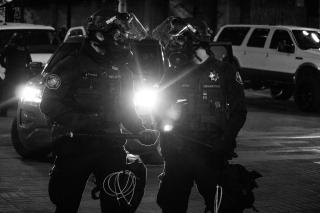This Violence Has A Target
By Zane Taylor
“Violence is not striking us by chance; this violence has a target.”
Ana Paula Oliveira, Brazilian Human Rights Defender
On June 22, 2022, the International Service for Human Rights hosted the virtual event “Resisting police violence: Demanding justice and accountability for victims of systemic racism” (YouTube) moderated by Iki Yos, an afrodiasporic-transborder artist, performer, and anti-racist activist. The webinar sought to outline the stories of various activists, mostly mothers whose children had been brutally murdered by police forces.
Hearing the experiences of women like Adrienne Hood, a mother from Columbus, OH, USA—whose son was shot, unprovoked, by non-uniformed police officers and who didn’t get to see her son in the hospital—cut right to the heart of the issue of unwarranted violence at the hands of the state. Hood mentioned, “I am not looking for reformation, I am looking for transformation,” in essence saying the policing system, on an international level, must be destroyed and rebuilt into the public safety institution it is supposed to be.
Ana Paula Oliveira, a mother from North Rio de Janeiro, organizes political training for women and combats misinformation from police forces about the violence facing BIPOC communities living in the periphery and told her story about her own experience with losing a son to police brutality. These women outlined that police brutality is not exclusively an American problem, but an issue that stems from the colonial roots of policing—a police force that was created by imperial powers that were white, wealthy, and discriminatory.
Many issues with police violence aren’t exposed until after violence at the hands of the state has already occurred. Ekim Dike pointed to the #EndSARS movement in Nigeria exacerbating the already violent practices carried out by Nigerian police. The Buhari administration in Nigeria had claimed to disband the Special Anti-Robbery Squad (SARS), but had later reorganized the structure of SARS, causing widespread protest that saw the massacre of 48 protesters and journalists at the hands of the Nigerian army and police. The army went on to block medics from reaching and assisting wounded protesters.
Being a white, socio-economically well-off man, I recognize the privilege that lies in my childhood neighborhoods’ rarely being patrolled by police, not having to worry about where my hands are or the tone of my voice in a traffic stop, and many other interactions with police forces. The thought of being unjustly murdered by police without due process of law or without reason, either, is not something that I have ever had to worry about. The “Resisting Police Violence” speakers pointed to the disproportionate violence from state entities perpetuated against BIPOC people, which often goes unreported by states at the risk of being accused of human rights violations. Many countries like Nigeria, the United Kingdom and Brazil have become signatories or ratified major international human rights treaties, but often fail to self-report domestic human rights data (DOC) to the United Nations Office of the High Commissioner for Human Rights in a timely manner.
Often, when looking at international issues, the question arises, “What can be done at the international level?” The main impediment facing international organizations is the unchecked value on state sovereignty (HTM) with regards to policy and to incident reporting. This leaves the world no option but to create change from the ground up, starting at local governments, voting in elections even as basic as county commissions and school boards (for readers in the United States) and in whatever country where you live. The vast majority of these issues are perpetuated by localized entities and actions to counteract violence must begin at the same level.
